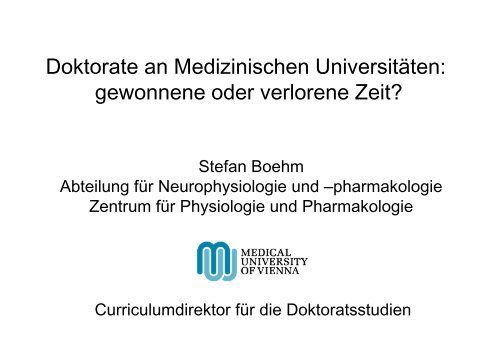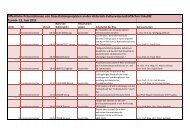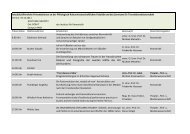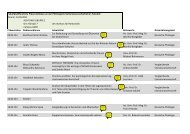gewonnene oder verlorene Zeit?
gewonnene oder verlorene Zeit?
gewonnene oder verlorene Zeit?
Create successful ePaper yourself
Turn your PDF publications into a flip-book with our unique Google optimized e-Paper software.
Doktorate an Medizinischen Universitäten:<br />
<strong>gewonnene</strong> <strong>oder</strong> <strong>verlorene</strong> <strong>Zeit</strong><br />
Stefan Boehm<br />
Abteilung für Neurophysiologie und –pharmakologie<br />
Zentrum für Physiologie und Pharmakologie<br />
Curriculumdirektor für die Doktoratsstudien
‚Whining PhD students are nothing new, but there seem to be genuine problems<br />
with iththe system that tproduces research hdoctorates t (the practical l“ “professional<br />
doctorates” in fields such as law, business and medicine have a more obvious<br />
value).‘ (The Economist, Dec 2010)<br />
‚PhD programmes in the sciences still overemphasize the academic<br />
track and actively devalue other career paths.‘ (Nature 472, April 2011)
N094<br />
N790<br />
“Science as profession”<br />
“Science in profession”
Equivalence of N094 and N790
Qualification profile N094
Qualification profile N790
Courses and ECTS credits<br />
N094<br />
N790
Propedeutics<br />
general<br />
knowledg<br />
ge and transfera<br />
able skills
Doctoral curricula,<br />
students, and graduates<br />
(since 2004)<br />
936 doctoral students, 184 doctoral graduates<br />
Doctoral Program of Medical Sciences<br />
86 students, 109 graduates<br />
PhD Program<br />
501 students, 70 graduates<br />
Doctoral Program of Applied Medical Sciences<br />
386 students, 5 graduates<br />
number of thes sis submissions pe er month<br />
10<br />
8<br />
6<br />
4<br />
2<br />
0<br />
2007 2008 2009 2010 2011<br />
month<br />
number of the esis defenses per<br />
10<br />
8<br />
6<br />
4<br />
2<br />
0<br />
2007 2008 2009 2010 2011
Doctoral students<br />
Medical Sciences<br />
PhD<br />
Applied Medical Sciences<br />
International<br />
Austrian<br />
0 20 40 60 80 100<br />
% of students<br />
0 20 40 60 80 100<br />
% of students<br />
0 20 40 60 80 100<br />
% of students<br />
Non-Medical<br />
Medical<br />
0 20 40 60 80 100<br />
% of students<br />
0 20 40 60 80 100<br />
% of students<br />
0 20 40 60 80 100<br />
% of students
6 Doctoral programs<br />
funded by<br />
Molecular Drug Targets
CCHD<br />
Cell<br />
Communication<br />
in<br />
Health and Disease<br />
A doctoral programme supported by<br />
the Austrian Science Fund (FWF),<br />
the Medical University of Vienna (MUW),<br />
and the Center for Molecular Medicine (CeMM)<br />
Coordinator: Sylvia Knapp
priority areas of research at the MUW<br />
Allergology / Immunology / Infectious diseases<br />
Oncology<br />
Neuroscience<br />
Vascular Biology<br />
Organ failure and replacement<br />
Inflammation<br />
Public health<br />
Basic medical and diagnostic research<br />
Intensive care research<br />
Metabolism (and nutrition)<br />
Cell<br />
Communication in<br />
Health and<br />
Disease
topics and supervisors of CCHD<br />
Immunology<br />
Erika Jensen-Jarolim:<br />
immunity towards oral antigens<br />
Sli Sylvia Knapp:<br />
innate immunity and bacterial infection<br />
Hannes Stockinger:<br />
T cell activation in real-time<br />
Giulio Superti-Furga:<br />
signalling pathway proteomics<br />
Vascular Biology<br />
Margarethe Geiger:<br />
serine proteases and coagulation<br />
Dontscho Kerjaschki:<br />
lymphatic endothelial cells<br />
Christine Mannhalter:<br />
pathogenic mechanisms in thrombotic diseases<br />
Neurobiology<br />
Inflammation<br />
Stefan Boehm:<br />
Hans Lassmann:<br />
mechanisms of presynaptic modulation pathogenic mechanisms in multiple sclerosis<br />
Michael Freissmuth:<br />
GPCRs and neurotransmitter transporters<br />
Thomas Klausberger:<br />
molecular machineries in cortical networks<br />
Werner Sieghart:<br />
GABA A receptor structure and function<br />
Cell<br />
Communication in<br />
Health and<br />
Disease<br />
Thomas Stulnig:<br />
mechanisms of adipose tissue inflammation<br />
Oswald Wagner:<br />
inflammation in atherosclerosis
major assets of CCHD<br />
internationally visible graduate programme<br />
multidisciplinary approach to study cell communication as basis for<br />
improved understanding of disease mechanisms and drug<br />
target identification/validation<br />
network of open laboratories with daily interactions<br />
training of excellent graduate students in medically relevant signal<br />
transduction research and in a broad range of advanced<br />
techniques<br />
integrated interdisciplinary teaching programme<br />
international exposure of the graduate students<br />
Cell<br />
Communication in<br />
Health and<br />
Disease
application-oriented further training<br />
(propedeutics)<br />
GSP and Ethics in Science<br />
(Ernst Singer, chairman of the Ethics Committee at the MUW)<br />
research in the pharmaceutical industry, GMP, GLP<br />
(Peter Turecek, senior dirctor R&D, Baxter, Austria)<br />
GCP and medical statistics<br />
(Sandor Fritsch, ,g global director statistics, Baxter, Austria)<br />
project management<br />
(Rudolf Widman, CEO of Austrian Orphan Pharmaceuticals)<br />
intellectual property rights<br />
(Harald Nemec, European Patent Attorney Company)<br />
scientific English, communication and funding<br />
(Edda Fiebiger, Children‘s Hospital, Boston, USA)<br />
basics of bioinformatics (Jacques Colinge, CeMM)<br />
basic infection biology (Sylvia Knapp, CeMM)
For further information see<br />
www.phd-cchd.at
previous doctoral students<br />
of the neuropharmacology group<br />
Nina Vartian<br />
Ursula Unterberger<br />
Thomas Scholze<br />
Stefan Lechner<br />
Hanna Edelbauer<br />
Simon Hussl<br />
Mario Dorostkar<br />
Klaus Schicker<br />
Kristina Kosenburger<br />
Felicia Klinger<br />
AOP Orphan Pharmaceuticals<br />
Clinical Institute of Neurology; AKH<br />
Baxter Austria<br />
Max-Delbrück-Center for Molecular Medicine, Berlin<br />
KAV<br />
Der Drink<br />
Center for Neuropathology, Ludwig-Maximilians-Univ. München<br />
Center for Physiology and Pharmacology, Medical Univ. Vienna<br />
Agneter Pharmaconsulting<br />
Clinic for Radiology, AKH<br />
aop orphan






